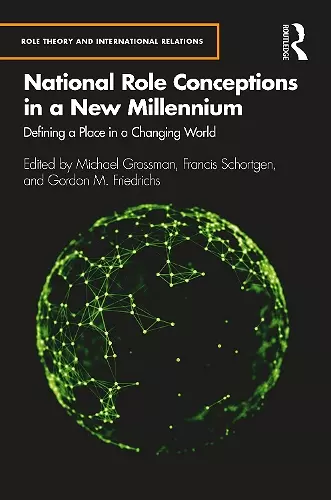National Role Conceptions in a New Millennium
Defining a Place in a Changing World
Michael Grossman editor Gordon M Friedrichs editor Francis Schortgen editor
Format:Hardback
Publisher:Taylor & Francis Ltd
Published:18th Feb '22
Currently unavailable, and unfortunately no date known when it will be back
This hardback is available in another edition too:
- Paperback£39.99(9780367552305)

National Role Conceptions in a New Millennium examines the transformation of the international system through an examination of the role conceptions adopted by the different global actors.
Advancing current role theory scholarship in International Relations, the contributors take as their starting point the question of how international actors are responding to the reordering of the global system. They reflect on the rise of new actors and the reemergence of old rivalries, the decline of established norms, and the unleashing of internal political forces such as nationalism and parochialism. They argue that changes in the international system can impact how states define their roles and act as a variable in both domestic and international role contestations. Further, they examine the redefinition of roles of countries and the international organizations that have been central to the US and western dominated world order, including major powers in the world (the US, Russia, China, Britain etc.) as well as the European Union, NATO, and ASEAN. By looking at international organizations, this text moves beyond the traditional subjects of role theory in the study of international relations, to examine how roles are contested in non-state actors.
National Role Conceptions in a New Millennium is the first attempt to delve into the individual motivations of states to seek role transition. As such, it is ideal for those teaching and studying both theory and method in international relations and foreign policy analysis.
"This book advances role theory scholarship by shedding light on how major global structural shifts affect national role conceptions. The chapters on international organizations also expand the reach of this theoretical perspective to heretofore under-explored agents. The book will be of interest to anyone who is curious about how states perceive structural changes and reevaluate (or not) their place in the world."
Cristian Cantir, Oakland University
"This volume brings role theory to bear on one of the biggest questions in international relations: how will countries adapt and accommodate themselves to new international roles as their relative power and position changes? Finding answers to this vital question would be enough to make this work an important contribution. By extending their analysis to the ways international organizations will also take on new roles in the 21st century, the authors push role theory in an unexpected new direction, marking another major advance."
Paul Kowert, University of Massachusetts Boston
"In the context of new actors taking on new roles and a rising polycentric world order, a vital question remains as to what shape future world politics will take. Here, role theory has great value as it goes beyond the surface of policy changes and provides more fundamental levels of analysis. Thus, readers will gain a better understanding of: which political concepts stand out; the impact of systemic changes; and the decision-makers’ ‘obsession’ with the role-play games—even when such roles deviate from ‘rational’ or expected responses."
Guangyi Pan, International Affairs
ISBN: 9780367545383
Dimensions: unknown
Weight: 453g
186 pages